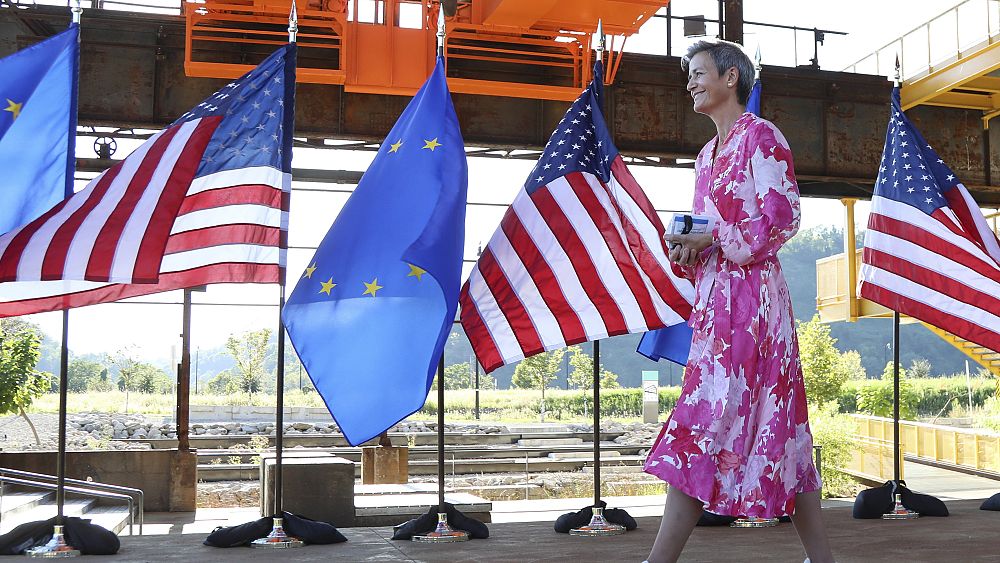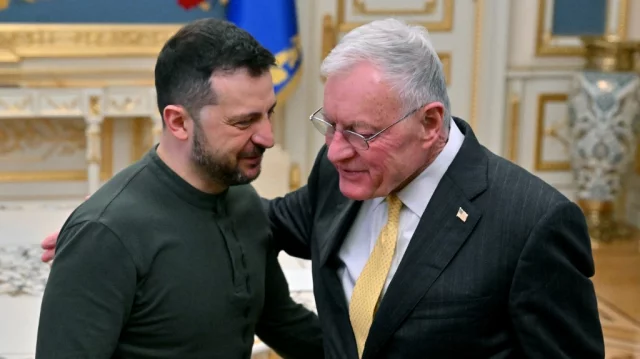
The European Union and the United States have set the stage for a new era of closer cooperation to determine the rules of trade and technology of the 21st century while simultaneously boost their domestic industries and achieve greater self-reliance.
Turning the page on four precarious years of fraught EU-US relations under the Donald Trump administration, the two Atlantic partners gathered in Pittsburgh, Philadelphia, for the first meeting of the EU-US Trade and Technology Council (TTC), a new forum designed to deepen economic ties, coordinate digital policy and ensure that any potential dispute is resolved swiftly and efficiently.
The bloc was represented by two of its heavyweight commissioners: Margrethe Vestager, who oversees the bloc’s digital policy and competition law, and Valdis Dombrovskis, in charge of economic and trade matters. The United States sent Commerce Secretary Gina Raimondo, Trade Representative Katherine Tai and Secretary of State Antony Blinken, whose presence as America’s top diplomat underlined the foreign policy dimension of the discussions.
The conclusions from the inaugural ceremony present a detailed and ambitious range of topics that the EU and the US vow to tackle together, including microchips, robotics, forced labour, disinformation, counterfeit, algorithm transparency, cloud infrastructure, cyber-security and digitalisation of SMEs, together with wider and more complex challenges, such as climate change, fair competition, regional peace and human rights.
“It’s just a remarkable spirit of cooperation, collaboration and a desire between the United States, the European Union, to work very, very closely together,” Secretary Blinken said about the communiqué.
The text, however, leaves out several points of contention that have strained transatlantic relations in recent years. Chief among them, the Trump-era tariffs imposed on EU-made steel and aluminium, which are worth €6.4 billion and remain in place since early 2018. The bloc retaliated with a first raft of €2.8 billion in extra duties on US imports but decided to suspend a scheduled second hike of €3.6 billion to give dialogue a chance to resolve the dispute.
Vice-President Dombrovskis said the two sides should reach an agreement by November if they want to meet the December 1 deadline. “Time is, in a sense, running out,” he told Bloomberg Television. His words were echoed by Secretary Raimondo, who in the days prior to the Pittsburgh meeting admitted the US still has “some work to do with the Europeans to get past the irritant”.
Another significant omission were EU-US data transfers, which have been hanging by a thread since the European Court of Justice invalidated Privacy Shield, the agreement that allowed data to flow across the Atlantic. The court argued the scheme failed to ensure an “adequate level of protection” and left EU citizens vulnerable to US surveillance.
The United States is eager to reinforce data flows, which underpin billions of dollars of digital trade, but the European Commission is taking extra care to ensure the new agreement respects the court’s ruling and is not struck down for a third time. (Privacy Shield’s predecessor, Safe Harbour, had to been annulled.)
“We’ve seen problems in the past with the Privacy Shield where we had different governance of privacy and it will create issues for our citizens, but also for our industries, and it will hamper trade and growth,” Cecilia Bonefeld-Dahl, director-general of DIGITALEUROPE, a digital technology industry association, told Euronews in an interview.
“This means a lot for European companies. We have 600,000 SMEs trading outside the EU and the main destination is America. It turns both ways, the same could be said for the US.”
The languishing reform of the World Trade Organization and the politically sensitive question of state subsidies are only briefly mentioned in the conclusions. The two partners choose to avoid altogether matters of taxation, which have become a source of friction after several EU countries unilaterally introduced levies on digital companies, most of which are American. The European Commission had plans to implement an EU-wide digital tax but decided to temporarily suspend the draft law until talks at the OECD level to reform the international tax system result in a deal.
Semiconductors supplies and trustworthy AI
The Trade and Technology Council is structured in ten thematic working groups, five of which have already produced joint commitments: technology standards (including artificial intelligence and emerging technologies), supply chains, exports control, investment screening and global trade challenges. The other five groups have been tasked with green tech, data governance, ICT security, technology misuse and SMEs support.
Semiconductors featured heavily in Pittsburgh. Semiconductors, the microchips that power millions of ordinary electronic devices, such as smartphones, computers and washing machines, have become a must-have item with serious geopolitical implications.
The world is facing an acute shortage of semiconductors due to supply chain disruptions caused by the coronavirus pandemic, a sudden economic recovery and ongoing trade tensions. The crisis, which shows no signs of slowing, has hit European and American companies and caused production delays.
The scarcity of chips has also shed light on the highly unbalanced distribution of the market, which is dominated by Taiwan in an almost-monopolistic fashion, followed by South Korea and China. Both the EU and the US resent their small market share – over 10% each – and are developing domestic proposals to boost domestic production and decrease over-reliance on Asia.
“We see this is an area of very fruitful collaboration, given that our interests are aligned and our struggles are similar at the moment,” said Secretary Raimondo after the meeting.
The two partners now want to join forces through the council and create partnerships to solve short-term supply chain problems, like the ongoing shortage. The joint efforts will also have a long-term vision to strengthen “domestic semiconductor ecosystems, from, research, design to manufacturing”. The Commission has recently pitched a European Chips Act, although no specific details have been revealed so far, while the US is already debating a CHIPS For America Act.
“We have to be realistic. This is a global market, we need to collaborate but we also have a shortage on production in Europe and the US. We need to find out who does what and how we make sure we have a critical supply,” said Bonefeld-Dahl, who participated remotely in the Pittsburgh meeting as one of the invited stakeholders.
“It’s not an easy fix.”
Artificial intelligence, a technology poised to transform the modern workforce, was equally high on the agenda. While the EU and the US recognise AI’s “potential to bring significant benefits to our citizens, societies and economies”, they are also wary of its damaging impact on personal security, fundamental rights and democratic values.
The two partners commit to develop a “mutual understanding” and a common set of monitoring tools to ensure that AI products are trustworthy, responsible, accurate and non-discriminatory.
The commitment, though, falls short of the EU’s desired goal, which is to bring the US closer to its regulatory framework. The Commission has put forward pioneering legislation to categorise and regulate AI-powered technologies according to their risk to human well-being.
The US, a country traditionally reluctant to far-reaching regulation, hasn’t taken a similar step and is unlikely to do so until the EU rules enter into force and prove their practical efficiency. However, the new council is meant to design and promote minimum standards on both sides of the Atlantic that could be eventually accepted and applied by other international allies.
“Minds are meeting for artificial intelligence to be trustworthy, to be human-centred and to have a risk-based approach, which of course will leave so much AI untouched by regulation from a political side,” said Vice-President Vestager, who’s spearheading the bloc’s AI rules.
Global trade challenges
Also on the Pittsburgh table were foreign investment and exports control, two areas where the EU and the US vow to maintain an open and regular dialogue to share information and synchronise their policy measures. Both economies want to increase their scrutiny over the activities of foreign investors, who might attempt to take over crucial industries for national security, like semiconductors and robotics. In recent years, non-Western countries like China, India, Russia and the United Arab States have extended their reach into international markets to acquire key technology they lack.
The meeting also touched upon global trade challenges, with numerous references to the unfair conduct of “non-market economies”. Although China is not mentioned by name, its presence is strongly felt throughout the final text agreed by the partners, who promise to rein in forced technology transfer, theft of intellectual property, market-distorting industrial subsidies and discriminatory treatment of foreign companies – a pattern of behaviour often linked to Beijing.
EUROFER, the European Steel Association, welcomed the TTC’s focus on distorting trade practices by non-market economies, which said involve not only China but also Russia and Indonesia.
“On a negative note, we observe that the TTC communiqué does not make any reference to the worsening global excess capacity in sectors like steel, which is actually the root cause of market disruptions and extreme volatility,” EUROFER said in a statement provided to Euronews. The dumping of cheap Chinese steel and aluminium has been credited with depressing US and EU prices.
Whether explicitly or implicitly, China will inevitably loom large over the TTC’s future discussions. How much the forum will be used as a foreign policy tool to counteract the rise of China is, however, a question still unanswered and might very well remain so for the time being.
In the days leading up to the Pittsburgh meeting, Vice-President Dombrovskis said the council was not about “any specific third country” but American officials are pushing a more direct narrative. The communiqué has a heavy emphasis on human rights and fundamental freedoms, which China usually dismisses as Western ideology but the US see as necessary to curb Beijing’s rise and convince the rest of the world to follow Washington’s lead. The EU, an equally strong advocate, prefers to keep human rights and economic matters on separate tracks.
The next TTC summit will take place in Europe in March, after France takes over the rotating EU presidency. France, one of the leading proponents of the EU’s strategic autonomy, attempted to delay the Pittsburgh meeting in retaliation of AUKUS, a new military pact between the US, the UK and Australia that resulted in the cancellation of a €50-billion submarine deal between Canberra and Paris.
The military alliance infuriated Paris, with many French officials publicly calling for a reset and rethink of EU-US relations. A call between President Biden and President Emmanuel Macron helped alleviate diplomatic tension and allowed the TTC to proceed as originally scheduled. The ten working groups are expected to continue behind-the-scenes negotiations so that leaders can unveil new commitments and joint projects at the end of the next summit.
One of the thorniest questions the council is posed to address is the power wielded by technology platforms. The European Commission has already made its move by proposing the Digital Markets Act (DMA), a far-reaching draft law laying out strict rules for large online platforms (so-called “gatekeepers”) to guarantee free competition, open markets and wider choices for consumers. But the US distrusts the EU’s efforts, which are seen as intrusive and overreaching.
“[The Europeans] are contemplating some really challenging regulation of our tech platform companies. Their Digital Markets Act, which I need to express strongly to them, there are reservations about that,” Secretary Raimondo said in the days prior to the Pittsburgh meeting.








